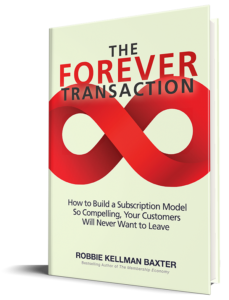Over the holidays, I started thinking about what my work on The Forever Transaction and The Membership Economy has taught me about building long-term personal relationships, which ultimately are way more important than any subscription.
As dig in on our 2020 to do lists, and focus on our goals and hopes for the year ahead, I wanted to share some ideas on how we can take these principles and apply them in our personal relationships. It’s a little hokey, and a little jargon-y business-school-ish but I decided to try using my 7-step framework as a guide.
- Organization. We need to organize our lives for long-term relationships. This might mean identifying key metrics that would tell you if you’re engaging in the right way with the right people. Many of my clients use Recency (when was the last time you saw them). Frequency (how often do you see them in any given year) and Depth (how meaningful, long, varied is the time you spend?) Or it means looking at your calendar at the beginning of each year and inserting placeholders for relationship priorities (date-nights, vacations, visits, book club meetings etc). And building a culture in your home of prioritizing key relationships in an explicit way.
- Funnel. If you’re in sales or marketing, you’re probably familiar with the concept of the funnel–at the top are all the people who could possibly become customers, and then some become “aware” of you, then “try” your services and then become “customers”. In the Membership Economy, we say that the moment of transaction is the starting line, not the finish line. In other words, the people who are customers should get at least as much attention and love as the people who haven’t committed. I think the same is true of personal relationships. My mom used to tell my sister and me, “Save your kindest actions for the people close to you”. I know that’s controversial and we should certainly strive for kindness every day, but the point she was making was that many families take one another for granted, but go out of their way to pull out the stops for more casual acquaintances.
- Onboarding. When you meet someone you want to be friends with, and particularly if they are important to a loved one (a new spouse for example), it can be useful to be deliberate in how you treat them, especially in the first few minutes, or the first few days after you meet. We’ve all been told not to judge a book by its cover, but only because that’s what we normally do. So invite them out more than once, go out of your way to make them feel welcome, and make it as easy as possible for them to trust and enjoy their time with you.
- Free. Ok, this one doesn’t translate as well as some of the others. This is the idea of thinking about what you are willing to give away, either as a trial, so someone understands what they’re getting or as a freemium subscription that is free forever. I guess for personal relationships, there are some relationship behaviors you might want to offer freely to all, even before you know if they’re someone who will become important to you.
- Tiers. Most forever transactions offer different tiers, for different kinds of people, or for people who need different experiences. You don’t want to be too complex, because that gets hard to track. So having rules of thumb for different types of relationships can make life easier.
- Customer Success. “We have to talk”. These words are terrifying. Many relationships save meaningful talk for problem solving. What if we took a page from the Software-as-a-Service Playbook and focused on the success of our relationships instead of the “not failing”? Customer Success is replacing Customer Support, with an emphasis on proactively optimizing customer value rather than waiting to respond to customer dissatisfaction.
- Technology. There’s an app for that. Pretty much for everything. Just as the Membership Economy has been enabled by the explosion in supporting technologies for subscription billing, digital community and customer success, there are so many ways that we can stay connected with the ones we love. But we need to be deliberate about how we text, email or participate in social media and remember that they are no substitute for good old F2F (that’s face-to-face).
I hope your new year is off to a good start. In 2020, may we all find time to deepen our relationships with the people who matter most and develop some new ties as well!



